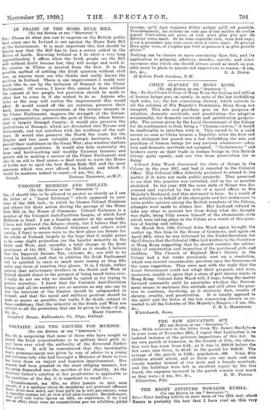CHILD SLAVERY IN HONG KONG.
(To THE EDITOR OF THE "SPECTATOR."]
Sra,—In the Crown Colony of Hong Kong the buying and foaling of human beings goes on openly, in spite of the law forbidding such sales, i.e., the law concerning slavery, which extends to all the colonies of His Majesty's Dominions, llong Kong not excepted. This sale and purchase goes on for purposes of adoption, domestic servitude, and prostitution—for adoption occasionally, for domestic servitude and prostitution pertetu- ally. The excuse given by the Local Government of the Colony for its continuance is that, being a "Chinese custom," it would be inadvisable to interfere with it. This ceased to be a valid excuse as soon as China became a Republic, when the first and most stringent law passed was a law forbidding the sale and purchase of human beings for any purpose whatsoever—adop- tion and domestic servitude not excepted. " Go-betweens " and brokers carry on their trade in human beings in this British Colony quite openly, and are free from prosecution for se doing.
Colonel John Ward discovered the state of things in the Colony in the year 1917, and had it reported to the Colonial Office. The Colonial Office definitely promised to attend to the matter if it were not made public property. They promised to see that this practice was curtailed, and as far as possible abolished. In the year 1919 the same state of things was dis- covered and reported by the wife of a naval officer in His Majesty's Dockyard, and this statement is hers. As-a result of her activities on behalf of the slave-girls and her endeavours to raise public opinion among the British members of the Colony. attempts were made to silence her. Her husband refused to take any steps to prevent her from doing what she thought was right, being fully aware himself of the abominable evils which were taking place in the Colony as a result of this prac- tice of buying and selling.
On March 31st, 1920, Colonel John Ward again brought the matter up, this time in the House of Commons, and again on April 26th, when he was informed by the Under-Secretary for the Colonies that the Colonial Office had written to the Governor of Hong Kong suggesting that be should consider the advisa- bility of registration and inspection of the purchased girls and children. The Church of England Men's Society in the Colony had a few weeks previously sent up a resolution, which was carried unanimously, pressing upon the Government the same suggestion. They were met with the reply that the Local Government could not adopt their propoeal, and were, moreover, unable to agree that a state of girl slavery exists in Hong Kong. Colonel John Ward will, I hope, bring the matter forward constantly until he ascertains whether the Govern-. ment means to maintain this attitude and still allow the pracs tice to continue, involving, as it obviously does, results of
slavery, cruelty, and prostitution. It is totally opposed to the spirit and the letter of the law concerning slavery as ex- tended to all the Colonies of His Majesty's Empire.—I am, Sir,






































 Previous page
Previous page